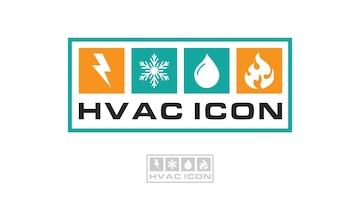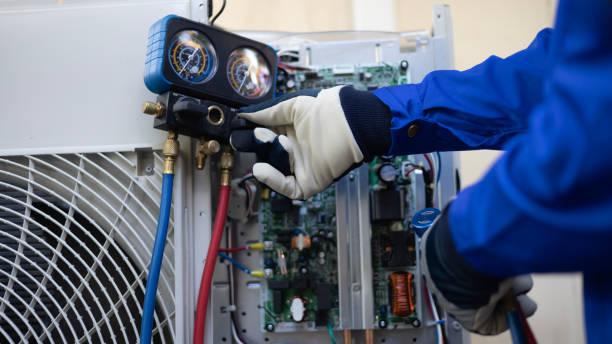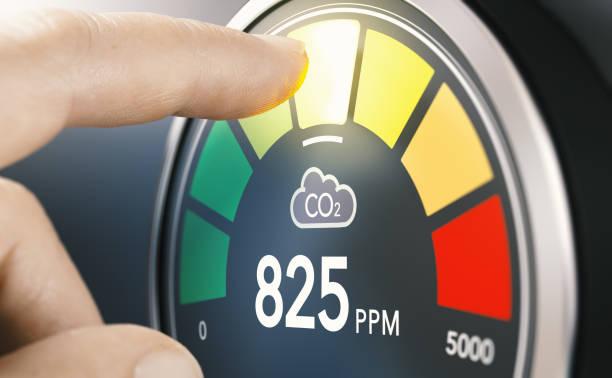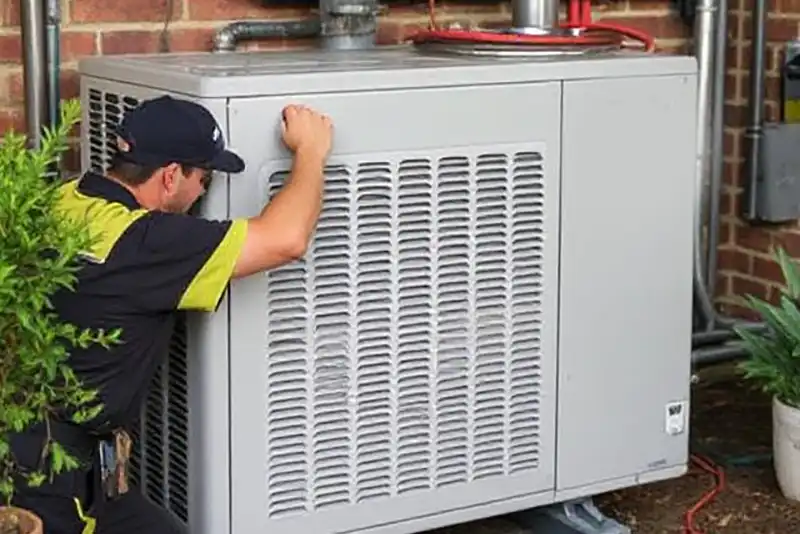When your AC suddenly stops working during a scorching Houston summer day with temperatures soaring above 95°F, or your heating system fails during an unexpected cold snap, you need more than just a quick fix—you need comprehensive heating and AC service from trusted professionals who understand Houston’s unique climate challenges. With the average Houston home running their AC system nearly 8 months out of the year, proper HVAC maintenance isn’t just about comfort; it’s about protecting your investment and avoiding the average $5,000-$7,500 replacement cost that comes from neglected systems.
Houston’s subtropical climate, with its extreme humidity levels reaching 90% in summer mornings and dramatic temperature swings, puts extraordinary stress on HVAC systems. According to the U.S. Department of Energy, Houston residents spend approximately 27% more on cooling costs compared to the national average, making efficient heating and AC service not just a convenience but a financial necessity.
Understanding Houston’s Unique HVAC Challenges
Houston’s climate presents specific challenges that homeowners in other regions simply don’t face. The combination of high humidity, salt air from the Gulf Coast, and year-round allergens creates a perfect storm for HVAC system stress.

The Humidity Factor
Houston’s average relative humidity hovers around 75% year-round, with summer mornings often reaching 90%. This excessive moisture doesn’t just make you feel uncomfortable—it forces your AC system to work overtime. “In Houston, your air conditioner isn’t just cooling; it’s working as a dehumidifier,” explains Mark Rodriguez, a certified HVAC engineer with 20 years of experience in the Houston market. “This dual function increases wear and tear by approximately 30% compared to drier climates.”
The moisture also creates ideal conditions for mold growth within ductwork and on evaporator coils, potentially affecting indoor air quality and system efficiency. Regular AC maintenance becomes crucial for preventing these moisture-related issues.
Temperature Extremes and Rapid Changes
While Houston is known for its heat, the city experiences surprising temperature variations. Winter cold fronts can drop temperatures by 40 degrees in just a few hours, switching your system from cooling to heating mode rapidly. This thermal stress contributes to component failure, particularly in heat exchangers and reversing valves.
Essential Heating & AC Services Every Houston Homeowner Needs
Understanding the full spectrum of HVAC services available helps homeowners make informed decisions about their system’s care. Here’s a comprehensive breakdown of essential services:
Preventive Maintenance Services
Regular maintenance is the cornerstone of HVAC longevity. The American Society of Heating, Refrigerating and Air-Conditioning Engineers (ASHRAE) recommends bi-annual maintenance for Houston’s climate conditions.
- Spring AC Tune-Up: Preparing your system for the intense cooling season with coil cleaning, refrigerant checks, and electrical component inspection
- Fall Heating Inspection: Ensuring safe and efficient heating operation with heat exchanger examination and carbon monoxide testing
- Filter Replacement: Monthly during peak season (May-September) and bi-monthly during moderate months
- Duct Inspection and Sealing: Annual inspection to identify leaks that waste up to 30% of cooled air
- Thermostat Calibration: Ensuring accurate temperature readings and optimal system cycling
Repair Services
Quick, accurate diagnosis and repair prevent minor issues from becoming major expenses. Common repair needs in Houston include:
| Issue | Frequency in Houston | Average Repair Cost |
|---|---|---|
| Refrigerant leaks | Very High | $200-$1,500 |
| Capacitor failure | High | $120-$475 |
| Frozen evaporator coils | High | $200-$900 |
| Compressor issues | Moderate | $1,200-$2,800 |
| Blower motor problems | Moderate | $300-$900 |

Installation and Replacement Services
When repair costs exceed 50% of replacement value or your system is over 15 years old, AC replacement becomes the economical choice. Modern systems offer significant efficiency improvements, with SEER ratings of 16-21 compared to older units at 8-10 SEER.
Professional installation includes:
- Load calculation to ensure proper sizing (Manual J calculation)
- Ductwork evaluation and modification if needed
- Proper refrigerant charging and airflow balancing
- Smart thermostat integration for optimal control
- System commissioning and performance verification
Creating Your Annual HVAC Service Schedule
A proactive service schedule prevents unexpected breakdowns and extends system life. Here’s a month-by-month guide tailored for Houston homeowners:
Spring (March-May)
March: Schedule comprehensive AC tune-up before cooling season begins. Clean outdoor unit of debris from winter storms.
April: Replace air filters, check drainage lines for clogs, test thermostat cooling settings.
May: Inspect ductwork for leaks, clean supply and return vents, verify refrigerant levels.
Summer (June-August)
Monthly tasks: Replace filters every 30 days due to constant operation. Monitor energy bills for unusual increases indicating efficiency problems. Keep outdoor unit clear of vegetation with 2-foot clearance.
Fall (September-November)
October: Schedule heating system inspection before first cold front. Test heating operation and carbon monoxide detectors.
November: Clean indoor vents, check weatherstripping around windows and doors.
Winter (December-February)
Monthly: Continue regular filter changes. Monitor heating performance during cold snaps. Schedule any needed repairs during mild weather periods.
Selecting the Right HVAC Service Provider in Houston
With over 500 HVAC companies operating in the Greater Houston area, choosing the right service provider requires careful evaluation. Industry statistics show that 40% of HVAC failures result from improper installation or service, making provider selection critical.
Essential Qualifications to Verify
- TDLR License: Texas Department of Licensing and Regulation certification is mandatory for HVAC contractors
- NATE Certification: North American Technician Excellence certification indicates advanced technical training
- Insurance Coverage: Minimum $1 million liability insurance protects your property
- BBB Accreditation: A+ rating demonstrates commitment to customer satisfaction
- Manufacturer Certifications: Factory-authorized status for major brands ensures proper warranty support

Red Flags to Avoid
Protect yourself from subpar service by watching for these warning signs:
- Extremely low bids (often 50% below market average)
- High-pressure sales tactics or limited-time offers
- Lack of written estimates or contracts
- No physical business address or established presence
- Unwillingness to provide references or license numbers
Understanding HVAC Service Costs in Houston
Transparent pricing helps homeowners budget effectively for HVAC services. According to HomeAdvisor’s 2024 data, Houston HVAC service costs align closely with Texas state averages but vary based on system type and service complexity.
Typical Service Pricing Ranges
Maintenance Services:
- Annual maintenance contract: $150-$500
- Single tune-up visit: $75-$200
- Duct cleaning: $300-$700
- Indoor air quality assessment: $200-$400
Repair Services:
- Diagnostic fee: $75-$150 (often waived with repair)
- Minor repairs: $150-$450
- Major component replacement: $500-$2,500
- Emergency service surcharge: 50-100% above standard rates
Factors Affecting Service Costs
Several variables influence your final service cost:
- System age and type: Older systems require more frequent repairs and specialized parts
- Accessibility: Attic or crawlspace units increase labor time
- Time of service: Peak season (June-August) commands premium pricing
- Service agreement status: Contract customers typically save 15-20% on repairs
- Energy efficiency upgrades: High-efficiency components cost more initially but reduce operating expenses
Maximizing Energy Efficiency Through Professional Service
The Environmental Protection Agency reports that proper HVAC maintenance can reduce energy consumption by 15-40%. In Houston’s climate, this translates to annual savings of $300-$800 for the average 2,500 square foot home.
Professional Efficiency Enhancements
Trained technicians optimize system performance through:
- Airflow optimization: Proper balancing ensures even cooling throughout your home
- Refrigerant charge verification: Incorrect levels reduce efficiency by up to 20%
- Control system upgrades: Smart thermostats save 10-23% on cooling costs
- Duct sealing: Eliminating leaks improves efficiency by 20-30%
- Insulation improvements: Proper attic insulation reduces cooling load by 15%

Emergency HVAC Services: When You Need Help Fast
Houston’s extreme weather makes HVAC emergencies particularly stressful. Understanding what constitutes an emergency and how to respond protects your family and property.
True HVAC Emergencies
- Complete system failure during extreme weather: Temperatures above 95°F or below 35°F
- Gas leaks or burning smells: Evacuate immediately and call from outside
- Electrical issues: Sparking, frequent breaker trips, or burning electrical odors
- Water leaks: Active leaking threatening property damage
- Carbon monoxide detector activation: Leave immediately and call for service
For genuine emergencies, 24/7 emergency service ensures rapid response, typically within 60-90 minutes in the Houston metro area.
Indoor Air Quality Services
Houston’s high humidity and year-round allergens make indoor air quality a critical health concern. The EPA notes that indoor air can be 2-5 times more polluted than outdoor air, making professional air quality services essential.
Comprehensive Air Quality Solutions
- HEPA filtration systems: Remove 99.97% of particles 0.3 microns or larger
- UV germicidal lights: Eliminate bacteria, viruses, and mold spores
- Whole-house dehumidifiers: Maintain optimal 30-50% humidity levels
- Air purification systems: Remove odors, chemicals, and VOCs
- Ventilation improvements: Ensure proper fresh air exchange

Frequently Asked Questions
How often should I service my HVAC system in Houston?
Due to Houston’s demanding climate, HVAC systems require bi-annual service—spring AC tune-up and fall heating inspection. Additionally, change filters monthly during peak cooling season (May-September) and bi-monthly during moderate months.
What’s the average lifespan of an AC unit in Houston?
In Houston’s harsh climate, AC units typically last 10-15 years with proper maintenance, compared to 15-20 years in milder climates. High humidity and extended operating seasons accelerate wear, making regular service crucial for maximizing lifespan.
Should I repair or replace my 12-year-old AC system?
Consider replacement if repair costs exceed $2,500 or 50% of a new system’s price. Factor in that newer units offer 40-50% better efficiency, potentially saving $400-$600 annually on energy costs. Systems over 12 years old using R-22 refrigerant should be replaced due to phase-out regulations.
What size AC unit do I need for my Houston home?
Proper sizing requires professional Manual J load calculation considering your home’s square footage, insulation, windows, and orientation. As a rough guide, Houston homes typically need 1 ton of cooling per 400-500 square feet, but oversizing reduces efficiency and comfort.
How can I reduce my summer cooling costs?
Implement these strategies: maintain 78°F when home, 85°F when away; use ceiling fans to create 4-degree cooler sensation; seal air leaks around windows/doors; add attic insulation to R-38; schedule annual maintenance to maintain peak efficiency; install a programmable thermostat for 10-20% savings.
What maintenance can I perform myself?
Homeowners can safely: change filters monthly, keep outdoor unit clear with 2-foot clearance, clean supply/return vents, check thermostat batteries, inspect visible ductwork for damage, and pour vinegar solution down condensate drain quarterly. Leave refrigerant, electrical, and mechanical work to licensed professionals.
Conclusion: Protecting Your Comfort Investment
Your HVAC system represents one of your home’s largest investments, typically accounting for 40-50% of your energy bills in Houston’s demanding climate. Professional heating and AC service isn’t just about maintaining comfort—it’s about protecting this investment, ensuring your family’s health and safety, and avoiding the frustration and expense of emergency breakdowns.
The key takeaways for Houston homeowners are clear: schedule bi-annual professional maintenance, address repairs promptly before they escalate, choose qualified service providers with proper credentials, and invest in energy efficiency improvements that pay long-term dividends. With Houston’s HVAC systems working nearly year-round, the difference between neglect and proper care can mean thousands of dollars in prevented repairs and energy savings.
Remember, the cost of prevention is always less than the price of neglect. A well-maintained system not only operates more efficiently—saving you money every month—but also provides reliable comfort when you need it most, whether during a sweltering August afternoon or an unexpected January freeze.
Ready to ensure your HVAC system is prepared for Houston’s challenging climate? Contact 75 Degree AC today at (713) 598-2737 for a comprehensive system evaluation and customized maintenance plan. Our certified technicians bring expertise, reliability, and transparent pricing to every service call. Don’t wait for a breakdown—schedule your professional heating and AC service now and experience the peace of mind that comes with a properly maintained system.

